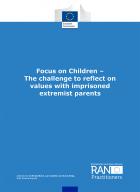Details
- Publication date
- 30 November 2021
- Author
- Directorate-General for Migration and Home Affairs
- RAN Publications Topic
- Prison and probation
Description
This paper provides an overview of projects in Europe concentrating on parents in prison, their children or both. Most of the projects focus on strengthening parenting competence and encouraging bonds and communication between imprisoned parents and their children. Präfix R, established in 2015 in Berlin, Germany, is a coaching programme for imprisoned parents, and is one of the few projects that combines a reflection on parenting values with deradicalisation interventions.
Through a new concept, Präfix R aims to initiate effects in the framework of early radicalisation prevention, particularly with respect to children. As developers and implementers of this programme, the authors would like to share the experiences and challenges of the past 5 years. These, alongside experience gained from working with detained parents in other projects, formed the foundation for a collection of lessons learned and conclusions, and shaped the definition of the conducive conditions to enable and support the implementation of these measures. This may inspire other practitioners and policymakers to create similar programmes.
Even though the authors’ work is primarily concerned with parents holding right-wing extremist attitudes, some of its elements are applicable to any form of extremism. Especially considering the continuing debate on returning foreign terrorist fighters (FTFs) and their family members from battlegrounds in Syria and Iraq, these experiences need to be taken into account when planning comprehensive rehabilitation and reintegration measures. Many adults who joined Daesh and have since returned or will do so in future are likely to be imprisoned for a certain period.
These parents will find it extremely difficult to maintain a supportive relationship with their children. Furthermore, parents holding both right-wing extremist attitudes and Islamist extremist beliefs often deeply distrust democratic systems and commonly transfer their own values to their children. In other words, the children of (former) Daesh members frequently grow up in families holding extremist beliefs and a society built on an ideological system that devaluates and hurts others.

